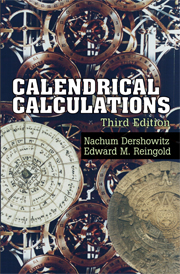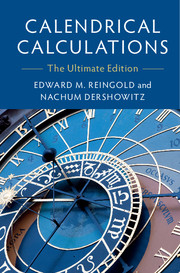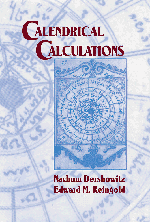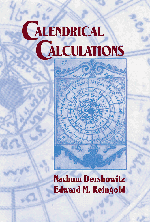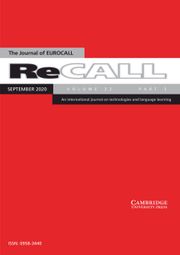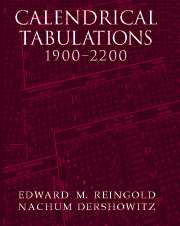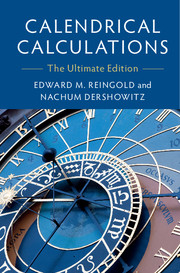Calendrical Calculations
A valuable resource for working programmers, as well as a fount of useful algorithmic tools for computer scientists, this new edition of the popular calendars book expands the treatment of the previous edition to new calendar variants: generic cyclical calendars and astronomical lunar calendars as well as the Korean, Vietnamese, Aztec, and Tibetan calendars. The authors frame the calendars of the world in a completely algorithmic form, allowing easy conversion among these calendars and the determination of secular and religious holidays. LISP code for all the algorithms are available on the Web.
- Has general appeal across computer science and beyond
- LISP code available on the web site
- Now includes generic cyclical calendars and astronomical lunar calendars as well as the Korean, Vietnamese, Aztec, and Tibetan calendars
Reviews & endorsements
'Because years, months, and days don't mesh simply, calendar making has been a challenge throughout history. Reingold and Dershowitz's compendium, here in its third edition, has already established itself as the definitive reference on calendrical structures. Their manual displays conversions between all the major calendar systems as well as between many fascinating schemes from bygone civilizations.' Owen Gingerich, Harvard-Smithsonian Center for Astrophysics
'One of the most fascinating books I've read all year. Takes chronology into the computer age with impressive erudition and elan. Just finding out what the calendar rules are is usually close to impossible: Calendrical Calculations tells you how to use them too. A must for everyone who worries about days, months, years – and why they never quite fit.' Ian Stewart
' … a good, comprehensive documentation of software for calculating dates on very many calendars.' P. Kenneth Seidelmann, Director of Astrometry, U.S. Naval Observatory
'… something of immense value … a true labor of love, this cultural service to humanity should be in every library of the world.' Choice
'If you are interested in Calendars this book is a must have - an excellent mind-broadening book.' Journal of the ACCU
' … this book must surely become the standard work on calendar conversions. No historian, chronologist or recreational mathematician should be without it.' E. G. Richards, Nature
Product details
No date availablePaperback
9780521702386
512 pages
234 × 155 × 23 mm
0.68kg
20 tables
Table of Contents
- 1. Introduction
- Part I. Arithmetical Calendars:
- 2. The Gregorian calendar
- 3. The Julian calendar
- 4. The Coptic and Ethiopic calendars
- 5. The ISO calendar
- 6. The Islamic calendar
- 7. The Hebrew calendar
- 8. The Ecclesiastical calendars
- 9. The Old Hindu calendars
- 10. The Mayan calendar
- 11. The Balinese Pawukon calendar
- 12. Generic cyclical calendars
- Part II. Astronomical Calendars:
- 13. Time and astronomy
- 14. The Persian calendar
- 15. The Baha'i calendar
- 16. The French Revolutionary calendar
- 17. The Chinese calendar
- 18. The modern Hindu calendars
- 19. The Tibetan calendar
- 20. Astronomical lunar calendars coda
- Part III. Appendices: A. Function, parameter, and constant types
- B. Lisp implementation
- C. Sample data.

